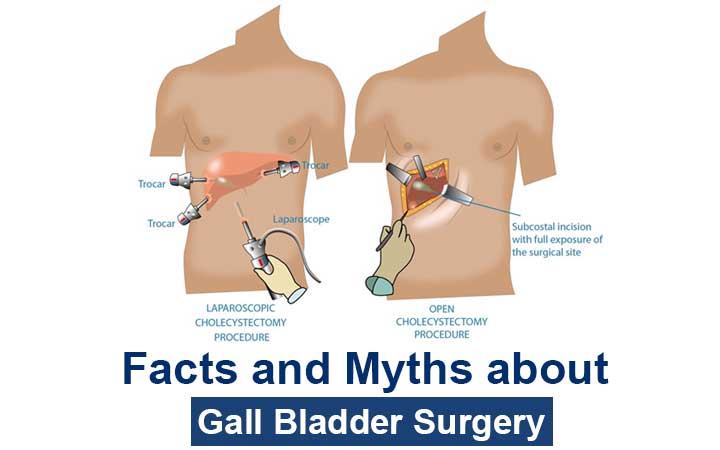Gall bladder diseases are very common these days. These diseases range from innocuous gall stones to cancer of the gall bladder which has a very dismal prognosis. As a GASTROINTESTINAL SURGEON with HEPATOBILIARY experience we daily see cases from one extreme to another. The majority are simple gall stones and are managed at the periphery, however, what we receive are ones that are either left to be referred to as higher-level or are complicated ones. Many a times we also deal with cases that are operated elsewhere and become complicated and are then referred to us.
So today in this blog I would like to discuss gall bladder diseases with a special focus on stone diseases. The most commonly asked questions in the patient’s mind are
How are stones formed?
Bile is juice produced by the liver and stored in the gall bladder and released when food reaches the small intestine. It is composed of bile salts, and pigments, and they are kept in solution form by mixing with cholesterol. So any change that disturbs this proportion of each component required to keep these in solution form can result in the formation of stones. For example diet rich in fats can result in high cholesterol components and can result in stone formation.
How can we prevent formation of gall stones?
Gall stones are usually formed by a mismatch in the concentration of cholesterol and bile salts in bile. So a balanced diet that is low in fats can help in decreasing the chances of gall stone formation.
What are risks associated with gall stones?
Gall stones can cause pain by themselves. They can result in jaundice if a stone slips into bile duct. It can cause pancreatitis which can be mild or life-threatening. The gall bladder neck can be blocked by stone resulting in huge distension of the gall bladder thus causing pain and can result in pus formation in the gall bladder. Large stones in gall bladder are risk factors for cancer of gall bladder.
If they are not causing any trouble, should I undergo surgery?
These are called asymptomatic stones. Asymptomatic stones usually do not require surgery unless
a. Patient is having low immunity
b. The patient is living in a place where medical facilities are meager.
c. Patient is undergoing surgery of abdomen for some other reason
Relative indications are
i. Multiple small stones
ii. Diabetic patient
iii. Large stone
Can we just remove stones and leave gall bladder behind?
We have to remove the gall bladder as its functionally abnormal and stones would reform. Moreover cut on gall bladder heal very poorly.
Will removal of the gall bladder affect my digestion?
There is no effect on digestion if the gall bladder is removed. Body adapts to removal of gall bladder very well and digestion is not affected at all.
What are dietary restrictions after gall bladder surgery?
There is no dietary restriction and the patient can have a normal diet as before. Digestive system adapts well to removal of gall bladder and there is no effect on the digestion of food.
Is it major surgery?
Gall bladder removal surgery is performed by laparoscopy. It is successful in more than 99% of cases. Occasionally it is done by open surgery if anatomy is difficult or there is a risk of injury to important structures. But as the experience of the surgeon increases chances of conversion to open procedure decrease.
Is it very painful?
Laparoscopy surgery is done through small cuts made on your tummy ranging from 0.5-1 cm. these are small cuts and pain is minimum.
Should we undergo open or laparoscopic surgery?
That is to be decided by the surgeon operating upon you. As mentioned above large majority of procedures can be done by laparoscopy and needs open surgery only if surgery is difficult or in the presence of gall bladder cancer.
How long does it take to remove gall bladder?
Surgery is never about time. It is better to finish the procedure safely than quickly. It may take from 10 mintues to an hour depending upon anatomy.
What are the risks of surgery?
Apart from anaesthesia risk that depends upon general condition of patient gall bladder surgery carries minimum risk. Still there is a small but real risk of bleeding, injury to bile duct or injury to bowel.
How long does it take to recover and get back to normal life?
Gall bladder surgery is usually done as daycare surgery and the patient is send home same evening of surgery. The patient is up about a Few hours after surgery and starts his normal routine within a few days of surgery.
How does the experience of the surgeon matter in gall bladder surgery?
The experienced surgeon has fewer conversion rate and the chances of complication are less. Surgeon experienced in hepatobiliary or gastrointestinal surgery can handle the majority of complications on table and can provide better outcome in difficult cases.
Why some people are unsatisfied after gall bladder surgery?
Gallstones can cause abdominal pain, bloating, or discomfort after food intake and the complications listed above. Symptoms such as indigestion, heartburn, constipation and increased frequency of stools are very common in the general population and are not related to gallstones. Mostly when the patients / treating doctors try to correlate these symptoms with gallstones it leads to unhappiness as these symptoms may not get relieved by the removal of the gall bladder. So proper patient selection and counseling can help avoid the unsatisfied patient.

 Book An Appointment
Book An Appointment